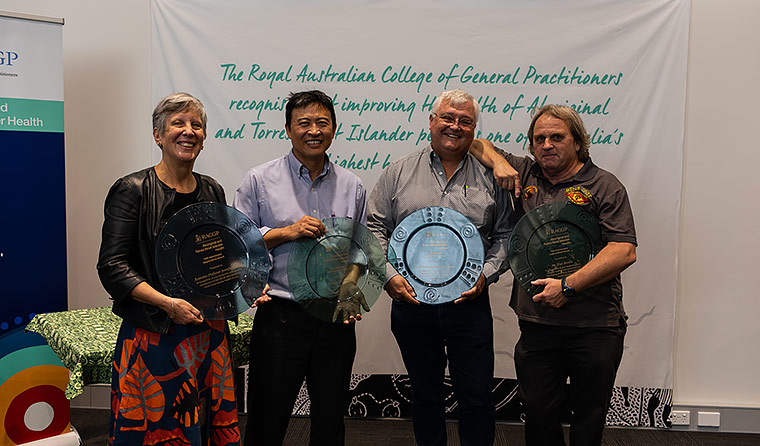RACGP
RACGP Aboriginal and Torres Strait Islander Health milestone
After a decade of hard work, key leaders reflect on the creation of RACGP Aboriginal and Torres Strait Islander Health.
 Associate Professor Brad Murphy and Associate Professor Peter O’Mara.
Associate Professor Brad Murphy and Associate Professor Peter O’Mara.
RACGP Aboriginal and Torres Strait Islander Health Chair Associate Professor Peter O’Mara described the college’s work in this area as ‘a shining light’ at the faculty’s recent 10-year anniversary event.
‘I think our college stands out – we are leaders in this space, through the commitment of the whole organisation,’ he told the audience.
Founded in 2010, RACGP Aboriginal and Torres Strait Islander Health emerged out of an earlier unit within the college that began in 2006, alongside a standing committee.
Driven by Dr Brad Murphy, GP, Associate Professor and Kamilaroi man, as well as Professor Jenny Reath and influential Aboriginal health advocate Alan Brown, the unit became a faculty, with Dr Murphy as the inaugural Chair.
Associate Professor O’Mara told newsGP he felt humbled to be part of the process, given the work that had gone on before his time.
‘I feel very positive about where things are going to go in the future for us,’ he said. ‘While we are a leader in this space, we don’t want to rely on that – we want to keep getting better and better all the time.’
Dr Murphy told newsGP that improving Aboriginal and Torres Strait Islander health also helps improve the health of the nation.
‘If we do Aboriginal and Torres Strait Islander health well, we can’t help but influence the healthcare of all Australians. It means better doctors, better healthcare teams and so it goes,’ he said.
‘Everyone in this room has a story. Most of us are very rarely straight out of school. Often there are surrounding problems with finances or family illnesses – no one around here had a silver spoon-type journey to get where we are.
‘That’s the basis on which this faculty is based. That’s the soil from which we’ve built. That’s really important to remember.’
Professor Jenny Reath was a manager in the early 2000s, when the unit was first established.
‘We’ve had fabulous leaders, which is a big part of our success,’ she told newsGP.
‘What I love about Brad is his incredible vision. We had a unit and Brad said, “I think we should be a faculty”. He made that happen.
‘What I didn’t realise about becoming a faculty was the seat on the board and the influence that created – it has made a huge difference.
‘Brad was absolutely the right person at the right time.
‘We were eyeing Peter [O’Mara] off, hoping he could step into Brad’s shoes, and he has led us – gently, humbly, respectfully but very strongly – to engage with the council and the board, to lead us to the next stage. We are incredibly fortunate.’
Professor Reath’s own work in paving the way for the faculty was recognised with a commemorative plaque, alongside Associate Professor Murphy, GP Dr Hung Nguyen and Allan Brown.

Professor Jenny Reath, Dr Hung Nguyen, Associate Professor Brad Murphy and Alan Brown receiving plaques.
After government funding to support Aboriginal and Torres Strait Islander health within the college ran out around 2005, Professor Reath remembers discussions about what to do next.
‘We thought, we can’t just stop. So the college funded the unit and standing committee,’ she said. ‘That was a landmark, funding it out of mainstream funds. We were the first college to do that.
‘I feel proud to be a member of the college, with the way it has worked in Aboriginal and Torres Strait Islander health. Enormously proud.’
For GP Dr Tim Senior, the faculty’s medical advisor, the highlight of the first 10 years has been the support provided to Aboriginal and Torres Strait Islander registrars as they work towards becoming a GP.
‘We’ve been able to provide help alongside the Australian Indigenous Doctors’ Association and Indigenous General Practice Registrars Network ahead of the exams,’ he said.
‘That’s important for the profession – it changes us all when we have Indigenous registrars in the college. That means Aboriginal and Torres Strait Islander people are our colleagues, and it means we listen better to people and learn how to provide culturally appropriate care.’
In recent years, a number of Aboriginal registrars have started at Dr Senior’s workplace, the Tharawal Aboriginal Medical Service.
‘What that means is that it gives patients a sense of relief – they don’t have to justify themselves or explain what’s happening,’ he said. ‘There’s this understanding of culture and its importance, and of the experience people may have had in the health system.
‘It gives a level of comfort.’
Log in below to join the conversation.
Aboriginal and Torres Strait Islander Health indigenous health RACGP
newsGP weekly poll
Which of the following areas are you more likely to discuss during a routine consultation?